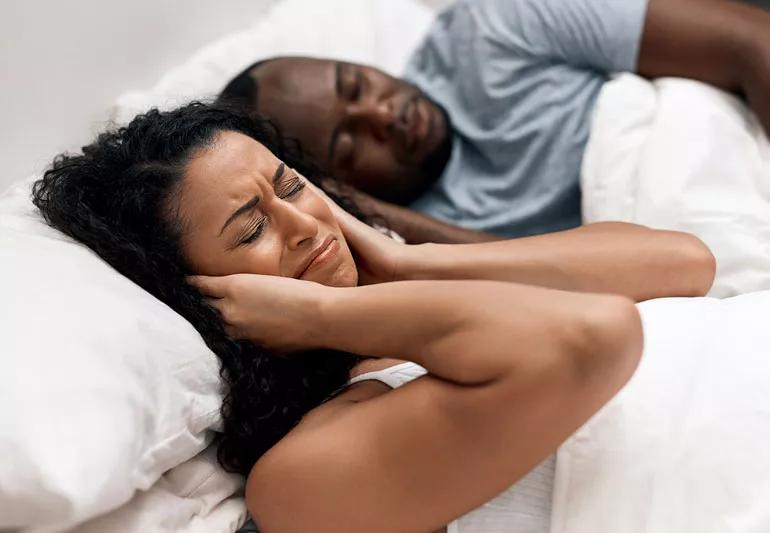Heroic snoring can be associated with obstructive sleep apnea

Image content: This image is available to view online.
View image online (https://assets.clevelandclinic.org/transform/809403f7-c5d8-4fd9-8e81-2d0f5c8eaee8/loudSnoring-942196970-770x553-1_jpg)
woman covering ears while husband snores in bed
That’s not a train horn going off again — it’s your partner’s snoring. Does your partner snore so loud you can hear it two bedrooms away? You might have a heroic snorer in your house.
Advertisement
Cleveland Clinic is a non-profit academic medical center. Advertising on our site helps support our mission. We do not endorse non-Cleveland Clinic products or services. Policy
Heroic snoring is when snores are loud enough that you can hear them through walls.
Although heroic snoring can be frustrating for the person who has to hear it throughout the night, it may signal a serious medical condition, says otolaryngologist and sleep specialist Alan Kominsky, MD.
“It’s important to realize that snoring can be more than just an annoying noise,” says Dr. Kominsky. “It can be associated with obstructive sleep apnea, which is a serious issue that may need to be addressed.”
Obstructive sleep apnea syndrome is a serious disorder that can turn into a major health risk and involves frequent breathing interruptions during the night due to blocked airways. If it’s left untreated, sleep apnea can create an increased risk for stroke, high blood pressure and heart disease.
When your breathing frequently slows down or stops while you’re sleeping, long-term changes can occur that are associated with cardiac, circulation and brain function problems. You’ll also wake up feeling groggy and not rested, which can snowball into not feeling your best throughout your busy days.
“Heroic snoring also can cause sleep disturbances and waking episodes,” says Dr. Kominsky. “These disturbances can prevent the brain from entering the restorative REM sleep stage, leading to mood, memory and concentration problems.”
Advertisement
If you suspect your partner of having sleep apnea, you can try monitoring their sleep patterns. Danger signs are apneic episodes that last more than 10 seconds to 20 seconds. It’s important that your spouse should consult with a doctor if you suspect heroic snoring or obstructive sleep apnea.
In general, snoring happens when the back of the roof of the mouth, called the soft palate, flutters and hits the back of the throat.
“Being overweight, having nasal congestion, breathing through the mouth while sleeping, and using anything sedating before bed, like alcohol or medications, can increase the chances of snoring,” says Dr. Kominsky. “Men are also more prone to snoring.”
To reduce the risk of snoring, try to:
If you live by yourself and don’t know if you snore or not, use a recording device or your smartphone to record your nights. This can help aid your doctor in helping diagnose sleep apnea.
“If all else fails, your dentist can make special dental devices to help separate the tissues in the back of the throat to help reduce the snoring,” he says. “There also are various methods available to stiffen the soft palate, which can help reduce the noise.”
Advertisement

Sign up for our Health Essentials emails for expert guidance on nutrition, fitness, sleep, skin care and more.
Learn more about our editorial process.
Advertisement
Using nasal strips and propping your head up in bed are just two ways that may help you stop snoring
Here’s why your sleep might be noisy or disruptive
Sleep masks can help you create total darkness so you can sleep better
To avoid sleep deprivation and shift work sleep disorder, try adopting habits that minimize light exposure and prioritize daytime sleep
Sleep disorders, mental health conditions and other health concerns can all affect the quality of your sleep
Most people fall asleep within 10 to 20 minutes, but if your experience is different, adjusting your sleep schedule may help
Tart cherry juice contains natural compounds that may support better sleep
If you’re waking up drenched, it could be menopause, stress, medications and other causes
Although it could be used as a moisturizer, this new trend is not recommended
Communicating clear limits helps protect your time, energy and emotional well-being
High cholesterol can be genetic, but testing and treatment can lower your heart disease risk